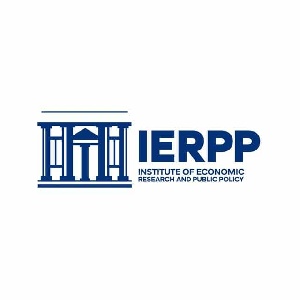- Home - News
- Elections 2024
- News Archive
- Crime & Punishment
- Politics
- Regional
- Editorial
- Health
- Ghanaians Abroad
- Tabloid
- Africa
- Religion
- Photo Archives
- Press Release
General News of Tuesday, 8 April 2025
Source: www.ghanawebbers.com
Fiscal shock ahead: IERPP predicts GH¢7.1 billion revenue drop from tax reforms
Prof. Isaac Boadi Warns of Revenue Loss from Tax Reforms
Prof. Isaac Boadi is the Executive Director of the Institute for Economic Research and Public Policy (IERPP). He also serves as Dean of the Faculty of Accounting and Finance. He has warned that Ghana's proposed 2025 tax reforms could lead to a revenue loss between GH¢5.5 billion and GH¢7.1 billion.
These reforms aim to ease financial pressures on households and businesses. While they may provide short-term relief, Prof. Boadi cautions against neglecting compensatory fiscal strategies. Without these strategies, public finances could destabilize, harming long-term economic resilience.
The IERPP emphasizes that without new revenue streams, Ghana risks prolonged fiscal instability.
Repeal of Electronic Transfer Levy
The government has repealed the 1% Electronic Transfer Levy (E-Levy). This decision fulfills a ministerial pledge and aims to boost Ghana’s digital finance ecosystem. Mobile money transactions fell by 30% after the levy was introduced in 2022.
With its repeal, transactions are expected to recover by 25–40%. This will enhance financial access for 58% of Ghanaians who lack formal banking services.
However, there are fiscal risks involved. The E-Levy generated GH¢1.46 billion in 2023 but had a target of GH¢4.7 billion. Its abolition means a loss of approximately GH¢517.7 million in the 2025 budget, worsening an already projected fiscal deficit of 8.5% of GDP.
Removal of Withholding Tax on Lottery Winnings
The government will also abolish the 10% withholding tax on lottery winnings, known as the "Betting Tax." This change offers relief to Ghana’s gaming sector, which saw revenues decline by 15% from 2023 to 2024.
Companies like LottoHub may rebound after cutting jobs due to tax impacts. However, public health concerns arise as gambling addiction affects about 4% of adults in Ghana.
While the gaming industry contributed GH¢78 million in taxes in 2023, projections for 2025 suggest only a marginal loss in total tax revenue.
Abolition of Emission Levy
The government plans to scrap the GH¢100/year Emission Levy on vehicles and industries. This move eases costs for manufacturers like Ghacem, potentially lowering cement prices by up to 3%.
However, this raises environmental concerns as carbon emissions increased by 5% in 2023. Abolishing this levy undermines green incentives and conflicts with COP28 climate pledges.
Originally projected to raise GH¢450 million annually, this revenue stream will now be lost.
Elimination of VAT on Motor Vehicle Insurance
The VAT on motor vehicle insurance premiums will also be removed. This is estimated to reduce annual revenue by GH¢1.4–2.8 billion.
While premiums could drop significantly for drivers, this further widens the fiscal gap affecting public finances.
Repeal of Withholding Tax on Gold Purchases
Additionally, there will be no more withholding tax on unprocessed gold purchases from small-scale miners. This aims to curb smuggling and encourage sales through official channels.
Despite improvements seen in pilot regions after discussions about tax reliefs, enforcement gaps remain significant with about 30% still leaking through informal channels.
This repeal sacrifices approximately GH¢297 million in potential annual revenue from gold sales projected at GH¢19.8 billion for next year.
Scrapping COVID-19 Health Recovery Levy
The government is also eliminating the COVID-19 Health Recovery Levy—a surcharge contributing between GH¢2.5–3 billion annually based on recent figures.
While this relieves businesses like Fan Milk Ltd., it threatens healthcare infrastructure critical during pandemics since it funded ICU bed expansions significantly between 2021 and 2024.
This repeal highlights tensions between providing business relief and maintaining public health resilience over time.
Total Revenue Loss Overview
According to IERPP estimates, total revenue loss from these repealed taxes is around GH¢5.5–7.1 billion—aligning with government spending-led adjustments outlined earlier.
| Tax Repealed | Estimated Contribution (GH¢) |
|-------------------------------------------|----------------------------------|
| Electronic Transfer Levy (E-Levy) | ~500 million |
| Betting Tax | ~80–100 million |
| Emission Levy | ~450 million |
| VAT on Motor Vehicle Insurance | ~1.4–2.8 billion |
| Withholding Tax on Gold | ~297 million |
| COVID-19 Health Recovery Levy | ~2.8 billion |
| Total Effect | ~GH¢5.5–7.1 billion |
---
IERPP's Recommendations for Fiscal Stability
To address looming fiscal challenges, IERPP suggests several strategies:
- Introduce a luxury tax targeting high-end goods.
- Enforce property taxes more strictly.
- Develop a carbon credit market leveraging forest resources.
- Diversify exports focusing on processed cocoa.
- Redirect mining royalties towards healthcare modernization.
These measures aim to balance fiscal stability while promoting sustainable development across Ghana's economy.
For more information: IERPP Contact: [email protected] | Accra, Ghana











